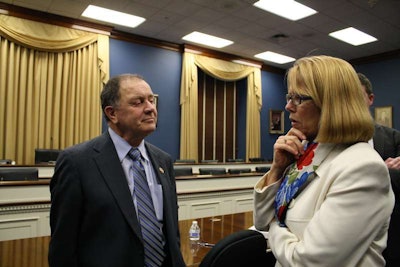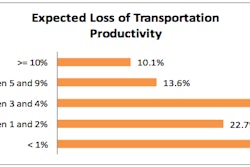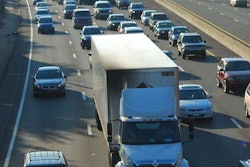Note: This is Part 1 of a two-part series on the hours-of-service hearing held Nov. 21 by the House’s Small Business Subcommittee. Click here to see Part 2, which covers the testimony and questioning of an owner-operator, fleet managers and a researcher from Penn State.
 Rep. Richard Hanna, chairman of the House’s Small Business Subcommittee, took FMCSA Administrator Anne Ferro (right) to task in a hearing Nov. 21 on trucking’s hours-of-service regulations. Here, the two talk after the hearing.
Rep. Richard Hanna, chairman of the House’s Small Business Subcommittee, took FMCSA Administrator Anne Ferro (right) to task in a hearing Nov. 21 on trucking’s hours-of-service regulations. Here, the two talk after the hearing.Administrator Anne Ferro persistently defended her Federal Motor Carrier Safety Administration’s hours-of-service rule Nov. 21 in a House subcommittee hearing, saying she is not open to repealing the regulations. “No, absolutely not,” she said when asked by subcommittee chairman Rep. Richard Hanna (R-N.Y.) whether she would be open to undoing the rule.
Members of the House’s Small Business Subcommittee didn’t pull any punches in questioning the administrator, who testified before the panel of congresspersons at a hearing dubbed “Wrong Way: The Impact of FMCSA’s Hours of Service Regulation on Small Businesses,” an oversight hearing organized to question the agency’s data and methodology and the perceived benefits relative to the knock in driver wages and fleet productivity the industry says it is incurring.
The rule, Ferro said, “is a solid rule. It’s been upheld by the court. It’s based on sound research,” she said.
As the committee name denotes, the hearing — in addition to questioning the agency’s methodology — was held to measure the effects the new hours provisions have on small businesses in America, said Hanna in his statement opening the event. Small trucking companies obviously are included in that measure, he said, but “nearly every type of small business in our country” utilizes trucking to makes its operation tick.

The hearing also provided a public evidence gathering for Hanna’s TRUE Safety Act bill, which he and two other congressmen introduced in the House last month. The bill would undo the hours rule change until the Government Accountability Office could study FMCSA’s methodology further.
Hanna and Rep. Tom Rice (R-S.C.) — both co-sponsors of the TRUE Safety Act — were the most pointed of the subcommittee members, continually trying to point out both the widespread and detrimental effects the trucking industry says it’s experiencing due to the rule changes and pressing Ferro on the quality of the data the agency used to make the rule and the reason she and the agency moved forward with the rule without having completed a field study.
Hanna said FMCSA has acted “arrogantly and insensitively” by moving forward with the rule without first performing and using the field study required by the MAP-21 highway funding act passed last summer. The agency, he said, “rushed into” creating a rule that “is inflicting pain on people,” citing American Transportation Research Institute data, which noted the rule will cost the industry $376 million annually and will cost drivers an aggregate $1.6 billion in wages each year.
“What do you say to somebody actually in the business, who didn’t spend two days in a truck but spent a lifetime in a truck, when she (a constituent) says the 1 to 5 a.m. has taken away quality of life, reduced productivity as well as disruption of the drivers’ normal sleep schedules?” Hanna asked. “And yet you’re supposed to be a data-driven organization.”
Ferro said the agency did not rush the rule, and that the hours provisions deserve discussion, because they affect both the lives of drivers and their businesses themselves. However, she said, she stands by the rule and its methodology. “[The rule] absolutely is data-based, research-based, fully vetted, [with an] unprecedented level of transparency throughout the development of this rule process,” she said. “So in terms of being either theory-based or philosophy or arrogant, we have been as open…”
Hanna cut Ferro off there to ask her “How she could say that” when she hasn’t completed the field study or taken into account the change of driver workload and has in effect pushed drivers “into hours that are more” congested. “Why is the agency so numb to the industry?” he said.
Ferro refuted that point as well, saying the industry has a great sensitivity for those in the industry, including drivers, and how the rule impacts them. As an aside to that point, she argued on a point of driver advocacy, saying Congress needs to address the issue of detention time and, more importantly, the lack of compensation for drivers when held for hours waiting to load or unload.
“Inadequate compensation — 36 cents a mile for a driver running 70 hours a week — is unconscionable,” she said.
Hanna quickly pushed the conversation back to the hours of service. “That’s got nothing to do with this issue. Why do you even mention that?” he asked. “We’re saying you’re actually making it worse for the very people you’re saying you want to help.”
***
Rep. Rice questioned the agency’s oft-cited life-saving benefit of the rules — 19 per year — saying that number is statistically invalid and mostly unmeasurable “That’s such a small percentage (1/2 of a percent), we won’t even know these rules are having any effect, will we?” he asked.
Ferro responded by saying the 19 lives estimated to be saved “is not a sample, but those are actual lives. Every life is precious,” she said.
Rice also belabored the consequences of the 1 a.m. to 5 a.m. restart provisions, potentially forcing drivers onto roads at more crowded times of the day, like morning and afternoon rush hours.
Ferro said the restart provisions do not do that. “This rule does not put trucks in traffic any more than they already are in traffic.” She also used the ATRI research to back up her own points, saying in an analysis of 40,000 logbooks, only 1/3 of 1 percent were substantively changed by the new hours provisions.
Rep. Scott Tipton (R-Colo.), along with Rep. Tim Huelskamp (R-Kan.), questioned Ferro on the field study. Study results were due in September, but Congress still hasn’t received it. Ferro said the study is under peer review and should be ready next spring.
Huelskamp also pressed Ferro on the age of the data used by the agency to create the rule, as it relied on crash data from 2003 and studies done in the 1990s. Ferro conceded the point, saying the agency has carried out analysis in an attempt to “move forward using more current numbers.”
One of Ferro’s final points of defense was a comparison of the number of deaths in trucking-related accidents to the airline industry: “The number of fatalities [if it were 1,000-2,000 a year in truck-related crashes] — we’re talking two to three 747 [jets] crashing every year. You wouldn’t tolerate it,” she said. “The American people wouldn’t tolerate it.”
Part 2 of this piece — which covers testimony from an owner-operator, fleet managers and a transportation researcher at Penn State — will run Friday, Nov. 22.










